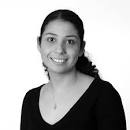
Dr Ashanty Melo Rodriguez
Dr. Ashanty Melo Rodriguez completed her undergraduate degree in Clinical Biochemistry at the Universidad de las Americas Puebla, Mexico in 2012. Her final year project was entitled “Evaluation of the immunoreactivity of Ki-67 as indicator in brain tumours” under the supervision of Dr. Luz del Carmen Quiroz. The aim of this project was to evaluate if Ki-67 can be used to indicate the growth fraction of brain tumours in paediatric patients using immunohistochemistry.
Following completion of her undergraduate degree, she then went on to complete an internship in the Department of Pathology at the University Medical Center Groningen in The Netherlands, under the supervision of Prof. Wilfred F.A. den Dunnen. Her roll here was to study the effect of CHIPs on astrocytomas samples via immunohistochemistry. Ms. Rodriguez then moved to Trinity College Dublin to undertake the M.Sc. in Immunology. Her 3 month project focused on the cytokine output of macrophages in the absence of UCP3. The aim of this project was to measure TNFα, IL-1β, IL-10 production by ELISA, and to determine the effect of UCP3 in the oxygen consumption rate and extracellular acidification rate. This project was done under the supervision of Prof. Richard Porter in the Trinity Biomedical Science Institute.
Ashanty was then granted funding from the Government of Mexico to carry out a Ph.D. in the Department of Immunology, School of Medicine in Trinity College Dublin, under the supervision of Dr. Derek Doherty and Dr. Joanne Lysaght. Her Ph.D. project focused on the use of NKT cells as novel cellular based immunotherapies for oesophageal and gastric cancer patients. This project carried out detailed functional and phenotypic analysis of human NKT cells and importantly to determine the effect of different chemotherapy drugs and radiotherapy on the NKT -cell viability and function. She is currently a Posdoctoral researcher in Prof. Eleanor Molloy’s lab in the Dept of Paediatrics and Child Health, Trinity Translational Medicine Institute as part of a HRB grant. Her roll here is to study whether multiorgan dysfunction seen in neonates with neonatal encephalopathy persists into early childhood and assess the degree of multiorgan dysfunction following neonatal encephalopathy in early childhood and to plan detailed followup.

